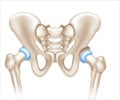- Hip Injuries and Disorders - (http://www.nlm.nih.gov/medlineplus/hipinjuriesanddisorders.html)
About
Hip Fracture is a break or fracture in the upper part of thigh bone (femur) near the hip joint. Falls account for most of the hip fracture cases in hospitals. People over the age of 65 years often have a greater threat for hip fracture since their bones weaken with age, and tend to break more easily. Moreover, complications associated with old age like poor vision and balance problems make older people more prone to trip and fall.
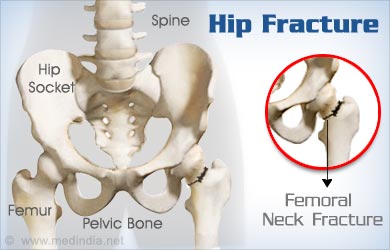
Hip fractures, in most cases, require surgery and several months of physiotherapy treatment for recovery. Around three in every 10 people who suffer a hip fracture die within a year. Around one-third of these deaths are directly related to the fracture.
Hip Fracture Causes
In older people, a hip fracture is mainly due to a fall. A severe injury due to a road accident or a fall from height can cause hip fracture in people of all ages.
Hip Fracture Symptoms
Symptoms of hip fracture include:
- Inability to lift, move or rotate (turn) the leg immediately after a fall.
- Intense pain in hip and groin, with bruising and swelling around the hip joint.
- Inability to stand or put weight on the leg of the affected side.
- The leg on the injured side appears shorter than the uninjured one.
Hip Fracture Risks
Several factors increase the risks for a hip fracture such as-
- Age and Sex: The older the age, the more is the rate of hip fractures. Advancing age causes decrease in bone density, and other health problems like poor vision, balance problems and slower reaction time, often predisposing to falls. Older women beyond menopause are more prone to brittle bones due to reduced estrogen levels, thereby increasing the threat of hip fracture.
- Diet: Deficiency of calcium and vitamin D in the diet at a younger age increases the risk of a hip fracture in old age. Eating disorders like anorexia or bulimia may also cause deficiency of important nutrients required by the bone.

- Medications: Steroid medications, such as prednisolone, weaken the bone if taken for long durations. Sometimes, the multiple medications prescribed in older individuals can cause dizziness, making the patient more prone to falling.

- Other health conditions: Chronic osteoporosis is the foremost risk factor for hip fracture. Medical conditions such as chronic kidney disease and intestinal disorders diminish the absorption capacity of vitamin D and calcium in body, leading to brittle bones. Hyperthyroidism could also result in thinning of bones.
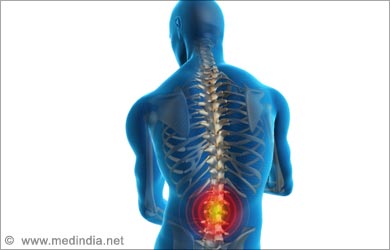
- Physical inactivity: Weight bearing exercises including walking help in strengthening of bones and muscles, thereby decreasing the risks of fractures.
- Tobacco and alcohol use: Smoking and drinking alcohol can interfere with the bone building and reconstructing, resulting in bone loss. Thus, people who smoke or are heavy drinkers are at a higher risk for developing hip fractures.

Hip Fracture Treatment
The treatment for hip fracture frequently involves a surgery.
Surgeries: The kind of surgery for hip fracture usually depends on the location of fracture, its severity and age of the patient. Surgical decisions may include:
- Internal Fixation (Repairing with hardware): Internal fixation involves fixing the fracture using devices such as pins, screws, plates and rods to hold the broken bone in place so that it can heal. Surgeons insert metal screws or place a support plate onto the broken bones to hold the parts together and heal the fracture. This type of surgery is mostly recommended in people over 65 years of age who have a fracture inside ((intracapsular) or outside (extracapsular) the socket of the hip joint.
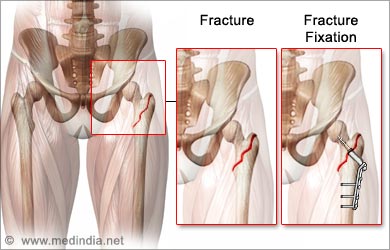
- Hemiarthroplasty: Hemiarthroplasty involves partial replacement of the femoral head with a prosthesis or artificial part. If the upper rounded end of the femur is broken or has been damaged completely, the doctor removes the head and neck of the femur and replaces it with an artificial metal replacement (prosthesis). This type of surgery is also called as partial hip replacement surgery.
- Arthroplasty (Complete Hip replacement): A total hip replacement surgery involves replacement of the upper femoral head and the socket in the pelvic bone with artificial prostheses. Total hip replacement is recommended in patients with arthritis or a damaged joint due to prior injury but who lead an active lifestyle and have reasonable life expectancy.
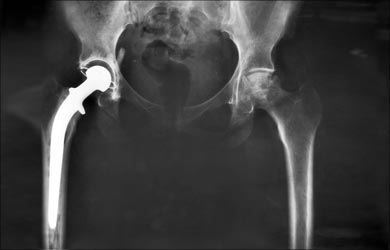
Medications: Bone density-enhancing medications called bisphosphonates are often prescribed post surgery to reduce the risk of an incidence of another hip fracture.



